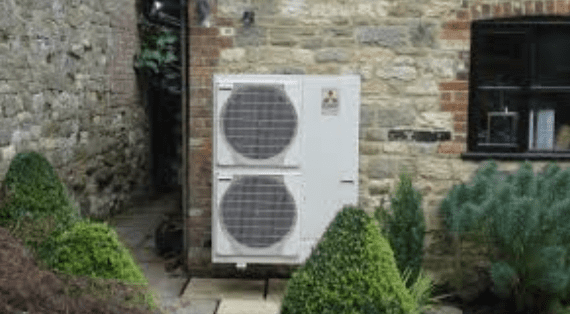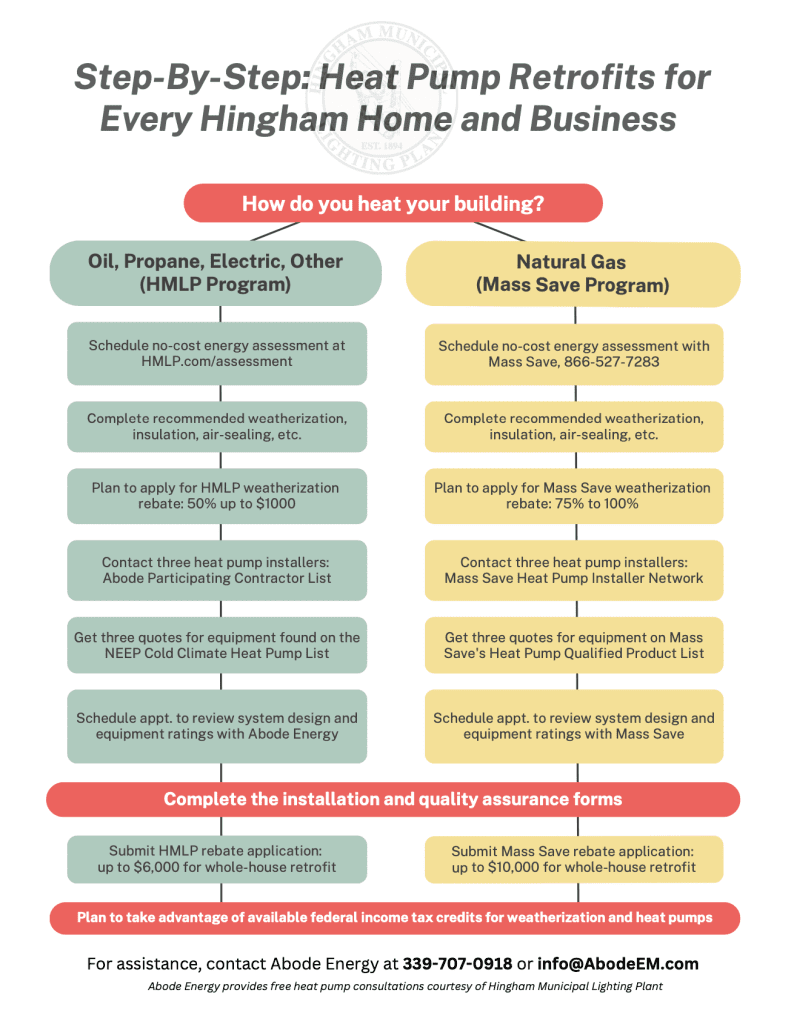
November 7, 2023 By John borger, Hingham Net Zero
Our last post was a primer on electric heat pumps. Why the focus on heat pumps? Hingham’s recently finalized climate action plan rank orders our sources of carbon emissions and shows that heating and cooling (HVAC) is our biggest challenge by far, responsible for almost 70% of emissions, followed by transportation at 23%. Around 4,000 of the Town’s 8,232 homes currently utilize an oil-fired furnace; a little less than 3,500 burn natural gas. Approximately 500 homes utilize some combination of fuels; only 108 homes heat with electricity. In order to reach net zero by 2040, fossil-fuel burning systems must be replaced by clean, efficient electric heat pumps. This means that, over the next 17 years, we must transition around 470 (8,000 divided by 17) homes each year to heat pumps. How are we doing?
In 2021, the Hingham Municipal Lighting Plant (HMLP) awarded rebates to 33 households switching from oil to heat pumps. In 2022, the number was 46 and, as of the end of September, the number was 42 for 2023. We can’t get data for households switching from gas to heat pumps, but even if twice these numbers are qualifying for MassSave heat pump rebates, that still falls far short of 470 homes. Heating systems generally have a useful life of around 15 years. Households that have paid for a new fossil-fuel fired furnace will naturally want to get full value and be unlikely to discard a functioning system in order to install heat pumps. So between now and 2040, we will essentially get one shot per household. We have to dramatically change the current trend. How will that happen?
Many observers hold that, as the market for electric vehicles offers more attractive, affordable choices, consumers will increasingly opt for EV’s and emissions from passenger vehicles will plumet. They are convinced that market forces will take care of our transportation emissions. Let’s assume for a minute they are right. Can we be confident that similar market forces will motivate households to switch to heat pumps in the coming years? There are several problems with this line of thinking.
First, cars are a major consumer item; people generally plan vehicle replacement well before their old cars fail. They are typically not acting in emergency situations. Second, consumers can select from a wide array of vehicle models and dealers intensely competing for their business. Comparative data is abundant and easily available. Car buyers typically have the time and information resources to independently make educated choices and get the best deal. Third, car makers spend enormous sums marketing their products directly to consumers and are increasingly pushing EV’s.
Now consider the market for home heating systems. Households tend to stay with their systems until a breakdown forces a change. Often, this occurs during the heating season and the quickest solution is to swap out an old oil or gas furnace for a newer model. Plus, households tend to rely on the guidance of their present heating contractor. Odds are, the contractor is not current with heat pump technology, does not have crew qualified to install them and prefers to stay with familiar products that have been profitable for them. There have been numerous reports of MassSave-approved contractors actively demarketing heat pumps. Finally, HVAC companies spend a relative pittance on direct-to-consumer marketing and focus primarily on dealers and installers.
It doesn’t look like we can rely on market forces to spur the necessary transition to heat pumps. What about building codes? The Massachusetts Department of Energy Resources has recently released its latest energy codes, as mandated by the Commonwealth’s “roadmap” climate legislation. Even the most stringent, “specialized, opt-in” code is almost entirely focused on new construction and major renovations. It does not mandate heat pumps when replacing fossil fuel heating systems in existing homes. Even for new or renovated homes, the new codes provide compliance “pathways” that allow continued use of fossil fuels in exchange for a more efficient building envelope that, compared to highly efficient heat pumps, only fractionally reduces emissions.
The daunting challenge of transitioning to heat pumps was cited as Boston’s “biggest lift” in the Inaugural Boston Climate Progress Report. The Globe reported that, “On the electrification effort, for instance, just 100 heat pumps were permitted in Boston’s single-family, two-family, and three-family homes in 2021…when the city needs to be installing more like 10,000 a year.”
This transition to heat pumps is Hingham’s “biggest lift” as well. Who can make that happen? You! So begin to plan your transition now. Go to the web site of Abode Energy Management, HMLP’s customer support partner for heat pumps: https://abodeem.com/homeowners/select-your-mlp/hingham/ Talk to Abode and/or request coaching from a Hingham Net Zero climate coach here: https://www.hinghamnetzero.org/climate-coaching. We’ve got to bend this trend. It’s up to us.






I have heard that Hingham residents are having trouble getting Mass Save rebates. Is this true? Please let us know if people are having difficulties.
Hi Peter, thanks for your comment. If you could supply me with a specific example offline, I would be happy to research the situation and perhaps write it up for the Anchor as a brief case study. It is unfortunate that the incentives offered at the federal, state and utility level each have their own specific requirements. To further complicate matters, they seem to be constantly evolving; some are time-limited, some may vary by income levels, etc. Our advice to homeowners is to discuss eligibility for incentives with the HVAC contractors up front as part of the process of refining and comparing estimates. Contractors find it is in their best interest to be well-informed about potential rebates, tax credits, etc. It helps in their marketing and pricing processes. They will typically help with the more technical aspects of the required documentation. Those transitioning off oil burners are in luck – their utility rebates come from the Hingham Municipal Light Plant. Contact HMLP and you will be routed to someone (a real human being, not a decision tree!) who can help you. All in all, the total package of incentives for green projects like heat pumps and residential solar has never been more generous. It’s well worth navigating the eligibility fine print. If you’ve ever shopped for new cell phone plan, trust me, you can do this! – John Borger
Thanks for your comment, Peter, sorry for the delay in responding. If you can furnish me with an example, I would be happy to research what happened and write it up as as a case study. But for now, let me offer the following:
First, let’s be clear that only Hingham residents with gas systems will be eligible for MassSave rebates. Hingham folks with oil burning systems are ineligible for MassSave heat pump incentives and get their rebates from Hingham Municipal Light Plant.
Second, it is unfortunate that the MassSave incentive program changes on an annual basis and eligibility requirements are adjusted based on the current status of several variables. Therefore, it is always a good idea for the homeowner to get the latest on the program. You can access current information about rebates by visiting this link: https://www.masssave.com/residential/rebates-and-incentives#heating-and-cooling. Or just Google “masssave rebates for heat pumps 2023”.
Third, a homeowner should always get at least three proposals from contractors for a heat pump system. Makes sure to ask the contractors to indicate if the system they are recommending qualifies for MassSave rebates and federal tax credits. As they are assessing the bids, homeowners should ask if the contractor will submit the MassSave paperwork – many of the larger contractors do this routinely.
Finally, there reportedly had been delays in homeowners receiving rebates during the general slowdown attributable to the COVID 19 lockdown in 2020 and 2021. Homeowners who are currently concerned about the status of their rebates can contact MassSave by calling 888-855-0340 or emailing to MARebates@Resource-Innovations.com for further assistance.
Hope that’s helpful – John Borger